Cortisol or "fear hormone" is responsible for stabilizing many processes in the human body. He takes on protective functions. Glucocorticoid has a beneficial effect on the intestinal microflora, preventing the development of inflammatory processes and providing an antiseptic effect.
Record content:
- 1 The role of cortisol in the human body
- 2 Where and how is the hormone produced, what factors determine the rate of synthesis?
-
3 The norm of the content of cortisol in the blood
- 3.1 Among women
- 3.2 In men
-
4 Tests to help determine the level of the hormone in the blood?
- 4.1 Blood test for cortisol
- 4.2 Urinalysis for cortisol
- 4.3 Saliva cortisol test
-
5 If the hormone level is high
- 5.1 Signs
- 5.2 Causes
- 5.3 Ways and means to lower the level
-
6 When cortisol is low
- 6.1 Symptoms
- 6.2 Causes
- 6.3 Level Up Methods
- 7 Complications with low and high hormone levels
- 8 Video about cortisol
The role of cortisol in the human body
The hormone takes part in metabolic processes taking place inside the body. It is responsible for enhancing the rate of absorption of certain minerals and nutrients. Cortisone can be considered a natural energy drink. With its increased concentration, malfunctions in the work of internal organs and systems can occur.
Cortisol is considered part of the body's response to stress.
The hormone has a number of negative effects. These include the ability of cortisol:
- increase blood pressure;
- slow down the growth of connective tissue, from which muscles are subsequently formed;
- flush calcium from bones, which leads to their fragility;
- affect blood sugar levels, causing hyperglycemia;
- disrupt the functional activity of the endocrine system;
- affect the work of the brain.
Disruptions in the synthesis of the hormone can lead to a decrease in the body's defenses and obesity. The hormone helps maintain the balance of water and sodium in the body. Its normal concentration helps to reduce the rate of fat deposition in the subcutaneous layer. The hormone ensures faster dissolution of proteins and acceleration of metabolism. Cortisol is also responsible for normalizing blood glucose levels.
Where and how is the hormone produced, what factors determine the rate of synthesis?
The adrenal glands are responsible for the production of cortisol. They receive a signal from the hypothalamus and begin to synthesize adrenocorticotropic hormone, which is responsible for triggering the reaction. ACTH can be considered a selective inhibitor of paired glands located at the level of 5-7 vertebrae. The adrenal glands are responsible for the metabolic functions of the body.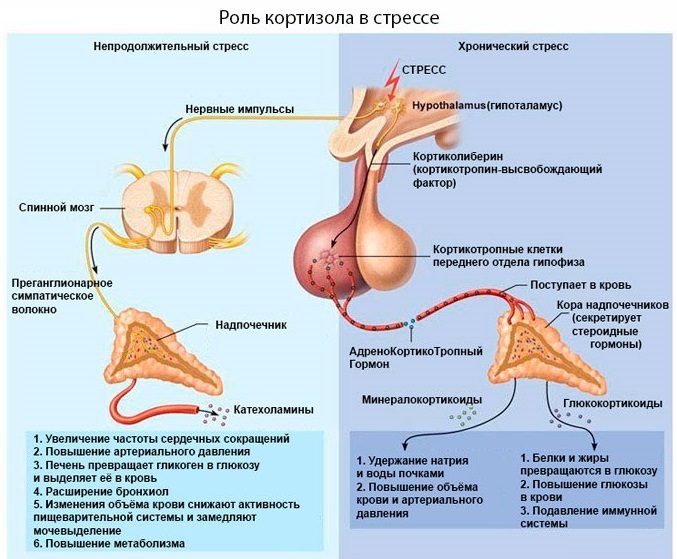
They consist of several structural parts:
- Cortical substance. Includes 3 zones: glomerular, reticular and bundle.
- Brain substance. It can be considered the control center of the paired glands. The substance receives signals, decodes and transmits them further.
The beam zone is responsible for the synthesis of cortisol. The process is characterized by secretion of a rhythmic type: in the morning hours, a surge of the hormone is observed, which gradually subsides in the evening.
Factors that can affect the production of cortisol include overexertion and stressful situations. They arise against the background of conflicts and other negative conditions. If the process of cortisol production is accelerated slightly, then the person feels a surge of vivacity and energy. His intellectual abilities are increased, as are the body's defenses. The sensitivity to pain is reduced.
If the hormone indicators have a significant deviation from the norm, then the risk of complications is high.
The norm of the content of cortisol in the blood
In men and women, the rate of cortisol in the body is different.
They can be affected by the following factors:
- the amount and quality of sleep;
- being in stressful situations;
- wrong diet.
To determine the norm, experts recommend passing the biomaterial for analysis to a laboratory.
Indicators without deviations:
- in the morning - 102-535 nmol / l;
- in the evening - 80-480 nmol / l.
Indicators vary slightly depending on the age of the patient.
Among women
Cortisol (a hormone) is responsible for suppressing inflammatory processes in the human body. In women who have experienced stress, glucocorticoid levels decrease more slowly. The body recovers for a long time (in comparison with the male). Studies have shown that in middle-aged women with two or more children, cortisol levels return to normal within a few hours.
During the day, the hormone is processed in the range of 20-30 mg. The peak of the reaction occurs in the early morning, so its concentration is 110-530 nmol / l. During the day, the indicator decreases to 80-470 nmol / l.
A surge in the hormone is noted during pregnancy at the end of the II - beginning of the III trimester. Indicators can be 1200-1300 nmol / l.
Hormone rate by age:
| Age | Index |
| Teenagers (13-16 years old) | 70-620 n / mol / l |
| 16-45 years old | 100-530 nmol / l |
| 45-70 | Less than 120 nmol / L |
| Over 70 years old | Less than 100 nmol / L |
A sharp jump in cortisol does not have a negative effect on the body. If a woman has experienced a shock, then the hormone breaks down within 2-3 hours. The liver inactivates cortisol and it leaves the body in urine.
Most often, an increase in the level of the hormone is observed against the background of a decrease in blood sugar levels, at the time of a fall or injury. If the indicators are always overestimated, then the risk of developing serious diseases (including cancer and Cushing's syndrome) is high.
In men
Cortisol (a hormone) in the human body is responsible for the normal functioning of smooth and striated muscle fibers of the myocardium. Cortisol levels in saliva, blood, and urine can vary. In men (in comparison with women), the indicators are slightly overestimated. They are influenced by the patient's mental state and the time of the expected delivery of the biological fluid for analysis.
Indicators may also differ slightly depending on the age of the man:
| Age | Indicators |
| 0-12 months | 25-965 nmol / l |
| Up to 5 years | 25-710 nmol / l |
| Up to 10 years | 28-1040 nmol / l |
| Up to 16 years old | 50-845 nmol / l |
| Over 16 years old | 150-630 nmol / l |
Free cortisol in men in urine varies between 60-480 nmol / L per day.
Tests to help determine the level of the hormone in the blood?
Cortisol levels in the body can be monitored in several ways. The attending physician directs the patient to take a blood, urine or saliva test.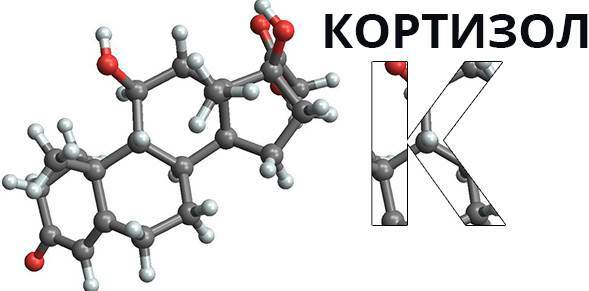
Main indications:
- confirmation or refutation of Cushing's syndrome;
- rapid weight loss;
- a decrease in the functional activity of the adrenal glands, accompanied by fainting and darkening of the skin;
- chronic fatigue, decreased blood pressure, general weakness;
- stunted growth in children;
- obesity, accompanied by the appearance of purple or purple stretch marks in the abdomen;
- suspected diabetes mellitus;
- polycystic ovary;
- muscle weakness.
To get a reliable result, you need to properly prepare for the procedure.
Blood test for cortisol
Men and women donate blood for cortisol early in the morning. If the patient visits the laboratory for the first time, then the doctor is obliged to explain the technique for collecting biological material. Women during menstruation are not prescribed an analysis.
Preparation rules:
- it is forbidden to have breakfast on the day of blood donation, venous blood is donated on an empty stomach;
- in 48 hours before the intended intake, it is necessary to completely abandon any drinks that contain alcohol (including low alcohol ones);
- in 24 hours before analysis, you need to give up tobacco products;
- in 48 hours before donating blood, it is necessary to reduce physical activity on the body;
- in 48 hours it is recommended to avoid stressful situations and anxiety before taking blood.
If a person is taking hormones, antibiotics and aminoglycosides, then their cancellation should be discussed with the attending physician. Analysis results will be ready in 24 hours.
Urinalysis for cortisol
5 days before the expected delivery of urine for analysis, it is necessary to cancel the intake of hormonal drugs. From the diet in 24 hours. exclude products that can color urine (blackberries, blueberries, carrots, beets, red bell pepper).
On the day of delivery, it is strictly forbidden to use:
- flour products;
- pastries and pastries containing a large amount of sugar;
- drinks that contain caffeine;
- spicy salty food;
- alcoholic drinks.
Overeating or starvation should not be allowed. For 48 hours Before passing urine, it is necessary to limit physical activity and try to remain emotionally calm.
The analysis is contraindicated if the patient:
- suffers from circulatory disorders;
- is undergoing rehabilitation after surgery;
- is in serious condition ("sugar" coma, shock).
A urine test for cortisol involves collecting the daily allowance. You do not need to collect the morning portion immediately after waking up. Urine is drained into a previously purchased sterile container (you can use a glass jar with a capacity of 3 liters), starting from the second urination. The exact time of collection is indicated on the form.
Store the sealed container in the refrigerator. After 24 hours. after receiving the first portion of urine, the biological material is mixed, poured into a plastic container of 50-70 ml and delivered to the laboratory. On the eve of the test, you need to get a preservative, which is subsequently added to the urine before transporting the urine to the laboratory assistant. The result can be found in 24-48 hours.
Saliva cortisol test
Preparation for the proposed analysis is standard: 24 hours in advance. it is not recommended to brush your teeth until the expected delivery of saliva. Saliva is collected from 23.00 to 00.00 - at this time, the lowest concentration of cortisol in the body is observed. A cotton swab is placed in the mouth, moistened in saliva and placed in a sterile container with a lid.
It indicates the exact time of collection of biological material. In the morning, the container must be delivered to the laboratory. Most often, the test results are given to the patient after 2 days. If there are wounds in the oral cavity, saliva is not collected.
If the hormone level is high
Cortisol (a hormone) is responsible in the human body for stabilizing the synthesis of glucocorticoids. High rates indicate the development of serious pathologies affecting the internal systems. Only the attending physician can identify the exact cause and make a diagnosis.
Signs
An increase in the level of the hormone is accompanied by a deterioration in well-being.
The first signs are considered:
- general weakness;
- spikes in blood sugar;
- frequent, prolonged hunger;
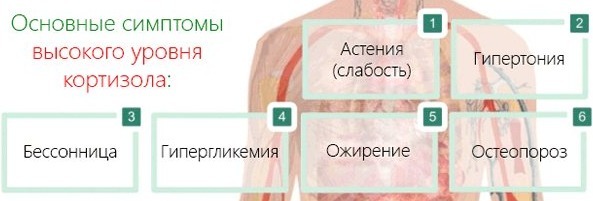
Elevated Cortisol Causes Similar Symptoms - pain in the kidney area;
- irritability, anxiety, apathy, aggression, depression;
- diseases of the skin, accompanied by a rash, stretch marks, ruptures of small blood vessels;
- lack of immunity to pathologies of infectious etiology;
- rapid formation of adipose tissue in the neck, face, back or abdomen;
- blood pressure surges;
- enlargement of the mammary glands in men, accompanied by hypertrophy;
- frequent bone fractures and ligament ruptures.
To eliminate the above symptoms. it is necessary to find adequate treatment.
Causes
The main reasons for the increase in the level of cortisol in the body can be considered:
- the development of hereditary diseases;
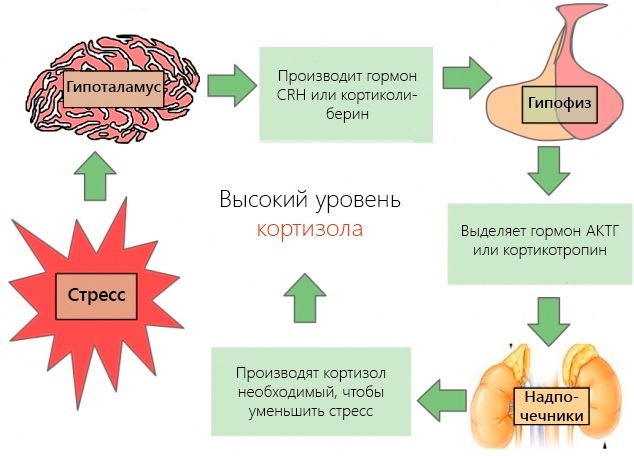
- abuse of drinks containing alcohol or drugs;
- violations of the functional activity of the endocrine system;
- damage to the biliary organ, including severe failure;
- diabetes;
- the presence of inflammatory processes inside the body;
- long-term use of corticosteroids;
- overwork provoked by hard physical labor;
- prolonged stay in a stressful situation;
- adrenal tumors;
- the growth of benign and malignant neoplasms.
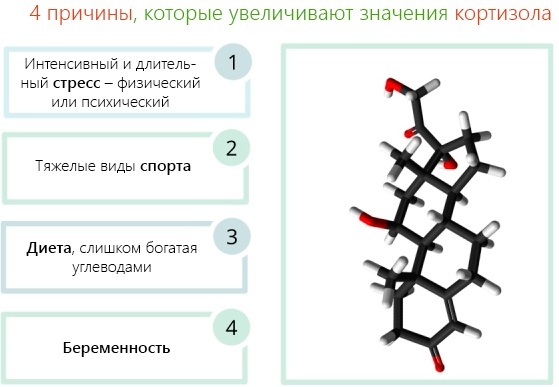 To find out the exact cause of the increase in cortisol levels in the body, your doctor may order a number of additional tests.
To find out the exact cause of the increase in cortisol levels in the body, your doctor may order a number of additional tests.
Ways and means to lower the level
There are several ways to lower your cortisol levels. Experts recommend adhering to the daily regimen: you need to go to bed and wake up at the same time. The rest period should be 7-8 hours.
Various sleep disorders contribute to the development of chronic fatigue, which negatively affects the hormone synthesis process. People with insomnia have high levels of cortisol all the time.
In stressful situations, experts recommend performing various exercises that promote relaxation. The most effective of these is breathing exercises. It is necessary to take several deep breaths and slow exhalations. The level of hormones in the blood can be reduced by soft, relaxing music.
Also, experts recommend practicing yoga. Massage and aromatherapy help normalize hormone levels.
You must try to limit yourself from stress. Feelings of guilt or shame can trigger a spike in cortisol. Nutrition also plays an important role. Sugar is considered a classic trigger that accelerates the release of cortisol. It is better to replace it with fructose.
High hormone levels can be caused by obesity. In this case, the patient is shown a diet aimed at getting rid of excess weight. Various dietary supplements contribute to the reduction of cortisol. It is impossible to select dietary supplements on your own, it is better to consult with your doctor.
When cortisol is low
Cortisol (a hormone) is responsible in the human body for ensuring the functional activity of the endocrine, urinary and hormonal systems. A decrease in corticoid can lead to infertility and loss of sex drive. The condition is accompanied by the development of characteristic symptoms.
Symptoms
A number of symptoms indicate cortisol deficiency in the human body.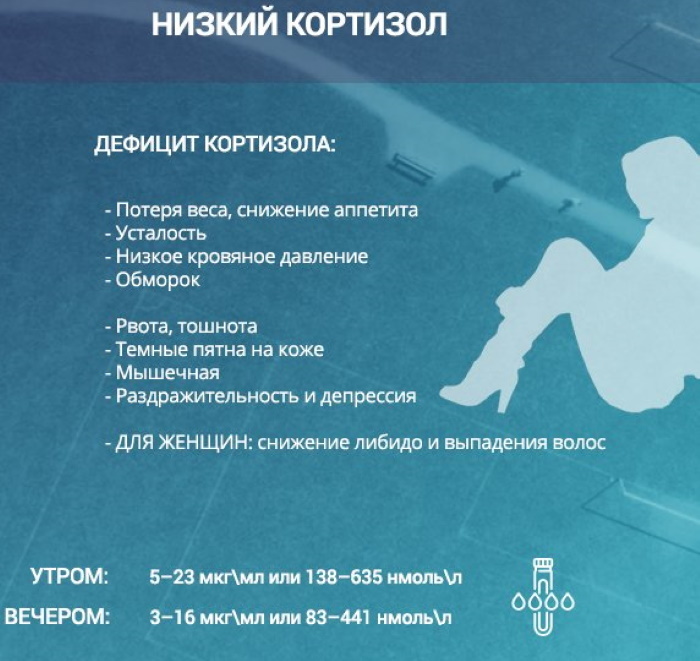
These include:
- attacks of sudden anxiety, apathy;
- isolation, depression, self-flagellation;
- decreased muscle tone;
- lowering blood pressure;
- the sudden appearance of age spots on the skin;
- wandering abdominal pain;
- the development of dyspeptic disorders (diarrhea, intestinal obstruction, vomiting, nausea, constipation, the formation of fecal congestion);
- semi-faint state;
- frequent dizziness, general fatigue;
- partial or complete refusal of food;
- rapid weight loss.
Symptoms suggestive of a cortisol deficiency can develop not only in adults but also in children.
Causes
A deviation from the norm of cortisol indicators in the direction of their decrease may indicate malfunctions in the work of the adrenal cortex, pituitary gland and hypothalamus.
Most often, the cause of violations can be considered:
- dysfunction of parts of the brain;
- surgical interventions on the organ;
- the growth of malignant and benign neoplasms.
Pituitary gland malfunctions can occur after radiation therapy.
The main reasons for the development of cortisol deficiency include:
- long-term use of hormonal drugs;
- the development of diseases of infectious etiology that have a negative effect on the adrenal glands (syphilis, tuberculosis);
- severe renal failure;
- damage to the cortex of the paired glands;
- dysfunction of the thyroid gland;
- drug abuse.
Adequate treatment is prescribed after an accurate diagnosis has been made. The specialist must first identify the root cause of the cortisol deficiency.
Level Up Methods
Drug therapy can help increase cortisol levels. It should include hormonal preparations of synthetic origin. It is necessary to take them for a long time. The attending physician who has prescribed medications is obliged to monitor the patient's well-being and monitor his condition.
Blood is donated regularly: first monthly, then every 2-3 months. Corticosteroids have a large number of contraindications and side effects. Against the background of long-term use of medicines in this category, there is a high risk of developing psychoemotional disorders and obesity.
If the level of cortisol in the body has reached a critical level, then the patient is prescribed hormone injections. They are used urgently to stop the crisis. The main goal of treatment is to identify and eliminate the root cause that led to the decrease in cortisol. In severe cases, the patient requires hormone replacement therapy (in violation of the functional activity of the adrenal glands).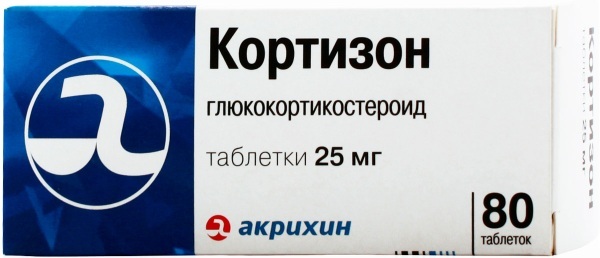
Non-drug treatment includes adherence to the daily regimen and proper nutrition. The patient must learn to control his own condition, avoiding conflicts and stressful situations. Sleep lasts at least 7 hours, experts recommend falling asleep and waking up at the same time every day.
With a deficiency of cortisol, the basis of the diet is made up of foods containing sugar, flour products, citrus fruits, vegetables and grains. Licorice syrup can also help increase cortisol.
Complications with low and high hormone levels
Cortisol is synthesized by the adrenal glands. The hormone is responsible in the human body for converting glucose into energy. If the patient has been in a stressful situation for a long time, stress and was influenced by other provoking factors, then surges in cortisol can provoke the development of complications. High rates lead to hormonal imbalances.
In the absence of adequate treatment, the patient's body becomes vulnerable to the negative effects of external stimuli. The increase in blood pressure becomes chronic. This leads to the development of diseases of the cardiovascular system.
In the human body, the process of glucose production is accelerated, which is accompanied by an increase in blood sugar levels. With an excess of cortisol, insulin synthesis is suppressed.
In this case, the risk of developing osteoporosis is also high: the patient's body stops absorbing calcium, which leads to fragility of the bones. With a hormone deficiency, a slowdown in the formation of T-lymphocytes is observed: the body's defense reactions are reduced.
If the level of cortisol in the body is increased, then potassium and sodium are quickly washed out of the body, which leads to an electrolyte imbalance. Patients with a hormone deficiency or excess are often obese. It occurs against the background of a violation of the digestive processes.
Patients may complain of memory impairment. The risk of developing atherosclerosis is quite high. In men and women, infertility is possible. The body is slowly recovering from mechanical injuries. The endocrine system works poorly, the process of hormone production is inhibited.
Deviation from the reference indicators can provoke the development of psychoemotional disorders. The person becomes anxious, depressed, irritated. Outbreaks of unmotivated aggression are possible. The patient often has suicidal thoughts.
Cortisol powers most of the internal systems in the human body. The hormone is responsible for the digestion of food, maintaining the psycho-emotional background and strengthening the immune system. It is necessary to regularly donate blood or urine for analysis in order to timely identify possible complications if the indicators deviate from the norm.
Video about cortisol
Blood cortisol:



